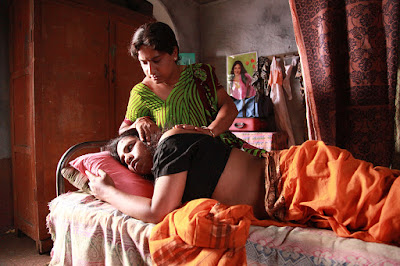SHE, HE, THEM AND US
Sanchari
Vijay’s sensitive performance as a transgender in the uplifting Naanu
Avanalla...Avalu ought to be seen by mainstream audiences outside Karnataka
By Anna MM Vetticad
The
audience breaks into applause as the central figure on screen snubs a
self-righteous stranger on a train.
The
actor in question is Vijay, but not that
Vijay whose face is plastered all
over Tamil Nadu. The character in question is the film’s lead, yet not the
now-cinematically-cliched Angry Young Man for whom such wolf-whistle-worthy
dialogues are usually written in India. As she dispenses her lines to an
antagonistic fellow though, viewers cheer the way they usually do for
mega-starrers filled with song ‘n’ dance, melodrama and bombast.
I
look around me, pleasantly surprised by this reception for the Kannada film Naanu Avanalla…Avalu (I Am Not He…She) in a large hall at the
International Film Festival of Kerala in Thiruvananthapuram. Although festival
crowds are often more open-minded than most, I was expecting some degree of
conservatism and discomfort in response to this film about a transgender called
Madesha/Vidya. Quite to the contrary, the audience here reacts with positivity
and plaudits.
Director
B.S. Lingadevaru’s Naanu Avanalla…Avalu
is the story of Madesha, born a boy in rural Karnataka. He is a bright student
but his peers are too busy mocking his effeminate demeanour to appreciate his
classroom acumen. As he grows older and becomes more aware of himself, he
begins to feel like a woman trapped in a man’s body. In a journey that takes
him from his village to Bengaluru, Pune and Cuddappah, Madesha earns an MA
degree and joins the hijra community
living on the shadowy margins of society, ultimately asserting a female
identity complete with women’s clothes, the name Vidya and castration (termed
“nirvana” in her circles). She then experiences discrimination in her quest for
a mainstream profession.
The
film is about Vidya’s refusal to let this social bigotry force her into a life
of begging and sex work. It is about her determination not to allow the
chauvinism of others to dictate her life choices. Except for one difficult
sequence dealing with the unhygienic conditions in which castrations are
conducted underground, this is a truly uplifting film. What makes it even more
so is the realisation, in its closing moments, that Naanu Avanalla…Avalu is drawn from a true story, the
autobiographical I Am Vidya: A
Transgender’s Journey by Chennai-based NGO worker and theatre activist
Vidya a.k.a. Living Smile Vidya.
Naanu Avanalla…Avalu
earned two National Awards this summer: Best Actor for Kannada theatre artiste
Sanchari Vijay’s restrained performance as Madesha/Vidya, far removed from the
caricaturish portrayals of transgenders in Indian mainstream cinema; and Best
Make-up. The film has also been screened at the Indian Film Festival of
Melbourne in August and the International Film Festival of India, Goa, in November.
It got a limited theatrical release in Karnataka on September 25. It ought to
be seen by mainstream Indian audiences outside Karnataka too.
The
public tends to assume that films with such subjects would be boring, heavy
and/or hard to watch. In truth, the lasting memory from Naanu Avanalla…Avalu is of Madesha’s smile when he realises for the
first time that there are others like him out there, and of Vidya’s compassion,
spirit and fire.
Such
as the scene mentioned in the opening paragraph, that flash of controlled
temper she displays on a train during her brief tryst with mendicancy, when a
passenger dismisses her as being uneducated and too lazy to work hard for a
living like everyone else. Vidya openly challenges him, pointing out that she
is, in fact, a postgraduate who society is unwilling to employ.
These
are scenes so commonplace in parts of India that we barely notice — hijras seeking alms, hijras barging into weddings to sing,
dance and demand money, hijras blessing
newly-weds and new-borns. Yet, transgenders are a rare sight in the mainstream.
Shabnam Mausi being elected to the Madhya Pradesh Legislative Assembly for
1998-2003, dancer-actor-activist Laxmi Narayan Tripathi appearing on the
reality show Sacch Ka Saamna in 2009
to dispel myths about hijras, and the
Supreme Court’s landmark 2014 ruling recognising transgenders as the “third
gender” have all been uncommon developments.
Over
the years, mainstream cinema has lampooned anyone who does not conform to
traditionally accepted notions of gender or at best has treated such persons as
a source of comedy and little else. Films like Mahesh Bhatt’s Tamanna (1997), with actor Paresh Rawal
playing a pivotal character who is a hijra,
have been unusual.
Vijay’s
National Award for Naanu Avanalla…Avalu
has come in a year in which the media has reported other significant
milestones: Madhu Kinnar was elected India’s first transgender mayor in
Chhattisgarh’s Raigarh Municipal Corporation this January, and last month, the
Madras High Court paved the way for K. Prithika Yashini to become the country’s
first transgender police sub-inspector.
For
the most part though, India’s transgenders remain an object of ridicule,
contempt, discrimination or, at the very least, apathy.
Even
the well-intentioned among us usually sweep away such issues into rarely visited
nooks and crannies of our minds where they are unlikely to give us a pang of
conscience or an attack of basic human decency. Naanu Avanalla…Avalu drags every discomfiting question out of those
dark corners into the light, compelling us to confront them and our own role in
perpetuating prejudice by, if nothing else, turning a blind eye to it.
(Anna
M.M. Vetticad is the
author of The Adventures of an Intrepid Film Critic. Twitter: @annavetticad)
(This column was first published in The Hindu Businessline newspaper
on December 19, 2015)
Original link:
Photo caption: Sanchari
Vijay as Madesha/Vidya in scenes from Naanu
Avanalla…Avalu
Photographs courtesy: MD Niche
Media Consultants



No comments:
Post a Comment